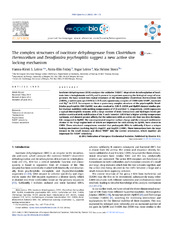The complex structures of isocitrate dehydrogenase from Clostridium thermocellum and Desulfotalea psychrophila support a new active site locking mechanism
Peer reviewed, Journal article
Published version
Permanent lenke
http://hdl.handle.net/1956/9919Utgivelsesdato
2012Metadata
Vis full innførselSamlinger
Originalversjon
https://doi.org/10.1016/j.fob.2012.06.003Sammendrag
Isocitrate dehydrogenase (IDH) catalyzes the oxidative NAD(P)+-dependent decarboxylation of isocitrate into α-ketoglutarate and CO2 and is present in organisms spanning the biological range of temperature. We have solved two crystal structures of the thermophilic Clostridium thermocellum IDH (CtIDH), a native open apo CtIDH to 2.35 Å and a quaternary complex of CtIDH with NADP+, isocitrate and Mg2+ to 2.5 Å. To compare to these a quaternary complex structure of the psychrophilic Desulfotalea psychrophila IDH (DpIDH) was also resolved to 1.93 Å. CtIDH and DpIDH showed similar global thermal stabilities with melting temperatures of 67.9 and 66.9 °C, respectively. CtIDH represents a typical thermophilic enzyme, with a large number of ionic interactions and hydrogen bonds per residue combined with stabilization of the N and C termini. CtIDH had a higher activity temperature optimum, and showed greater affinity for the substrates with an active site that was less thermolabile compared to DpIDH. The uncompensated negative surface charge and the enlarged methionine cluster in the hinge region both of which are important for cold activity in DpIDH, were absent in CtIDH. These structural comparisons revealed that prokaryotic IDHs in subfamily II have a unique locking mechanism involving Arg310, Asp251' and Arg255 (CtIDH). These interactions lock the large domain to the small domain and direct NADP+ into the correct orientation, which together are important for NADP+ selectivity.

